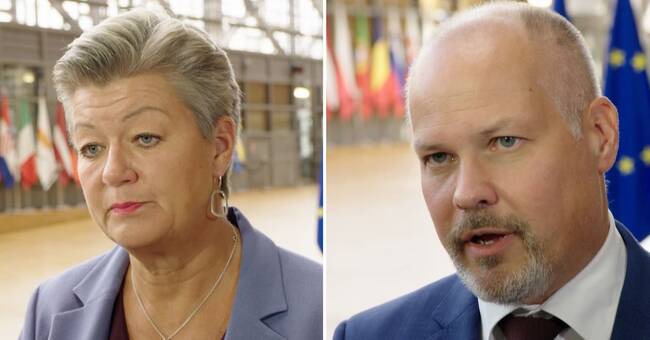Security and migration are in focus for the afternoon talks in Brussels.
In a joint statement, ministers are expected to promise to "do their utmost" so that the situation does not lead to "new security threats against EU citizens".
Not least, the EU concern is about avoiding a new refugee crisis in the style of 2015, when hundreds of thousands of refugees, mainly from Syria, arrived in the Union.
"The EU and its member states are determined to act together to prevent a recurrence of uncontrolled, large-scale illegal migration movements," reads a draft statement leaked ahead of the meeting.
Help for the UN
Minister of Justice and Migration Morgan Johansson (S) nevertheless states that the situation is now completely different than six years ago.
- It is much more difficult to get through Europe now.
The risks - if you look at it that way - for it to be a similar situation as in 2015 are much smaller now, says Morgan Johansson on his way to the meeting.
Instead, he stresses the importance of now avoiding a humanitarian catastrophe inside Afghanistan and the surrounding area, by supporting, above all, various UN agencies, which remain in place in the country.
Similar words are heard from EU Interior Commissioner Ylva Johansson.
- The UN is in place and they are still there.
And it is a way to be able to channel financial support, which can go directly to both those who are forced away from their hometowns but also other types of support, says Johansson in Brussels.
New agreements?
Tuesday's statement is expected to include promises of, among other things, strengthened support for Afghanistan's neighbors to arrange protection and safe conditions for refugees.
On Monday, Austria, together with Denmark and Greece, will hold a separate meeting with representatives of Uzbekistan, Tajikistan and Turkmenistan.
However, both Sweden and the European Commission are skeptical that it will be able to land in new migration agreements, in the style of what the EU has with Turkey, which receives billions in support for dealing with refugees from Syria.
- I do not think it is appropriate in this situation to look at special migration agreements, but it is about other types of support, says Ylva Johansson.
- All contacts that can be made and conversations you can have are good.
But the question is how to go in with, for example, EU money in these countries in a safe way, without that money disappearing for purposes for which we do not want it to disappear.
There is a great risk of corruption, for example, says Morgan Johansson.
Quota refugees
The issue of taking care of more refugees directly from Afghanistan is also expected to be discussed during Tuesday's meeting.
However, concrete promises from EU countries will have to wait until a later time.
- I will invite you to a new quota refugee meeting with both member countries and other countries, because here it is important that we act together.
In this situation, the proportion of Afghans probably needs to increase, says Ylva Johansson in Brussels.

